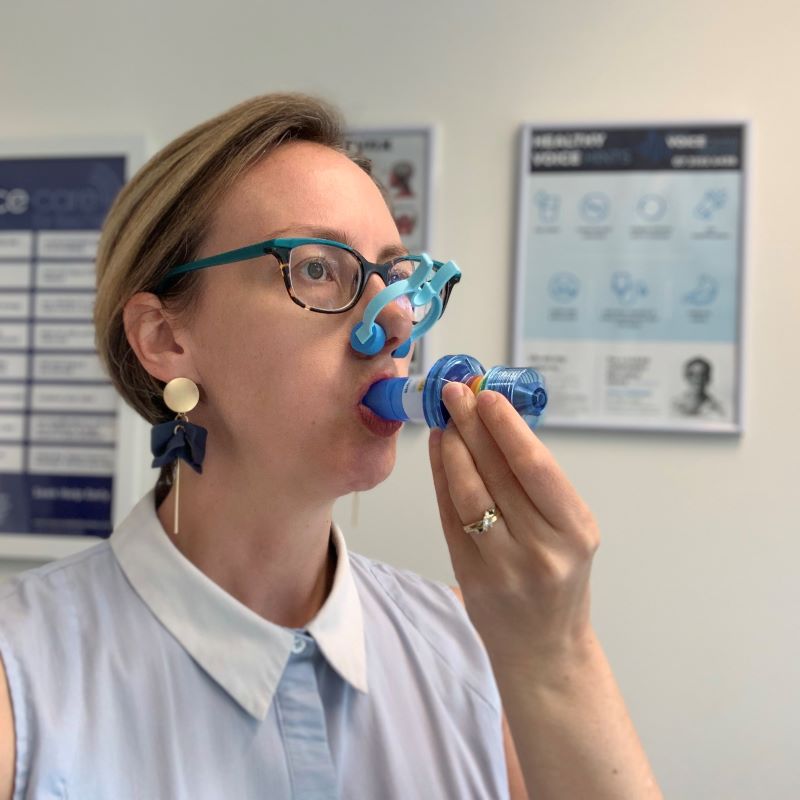Do you sometimes have trouble getting air into your lungs, but don’t have asthma? Vocal cord dysfunction (VCD) is an uncommon breathing condition that’s often mistaken for other conditions. It’s also known as Paradoxical Vocal Fold Dysfunction (PVFD), Inducible Laryngeal Obstruction and Exercise Induced Laryngeal Obstruction. It is most common in women, but also occurs in men and sometimes in children.
VCD affects your ability to breathe in, which can cause a mild shortness of breath to severe choking or the inability to breathe. It can also impact your voice. The key to managing this condition is to understand what’s happening. That’s why we’ve created this guide to VCD and what you can do about it.

What is vocal cord dysfunction?
Vocal cord dysfunction is an uncommon condition that causes your vocal folds to be uncoordinated. Your vocal cords are located in your larynx and open when you breathe in and out, allowing air into and out of your windpipe and lungs.
When you have VCD, your vocal cords close instead of opening when you breathe in or out. This makes it hard to get air in or out of your lungs. This is similar to another issue known as inspiratory laryngeal obstruction (ILO), which causes the same difficulty breathing in. It’s also similar to exercise induced laryngeal obstruction (EILO), which causes the same symptoms, but only when you exercise.
VCD can be very frightening and is often mistaken for asthma. However, if you’re diagnosed with asthma when you actually have VCD, asthma medication is unlikely to help and may cause other side effects. Occasionally, asthma and VCD can occur at the same time, causing more confusion! This is why a team approach to your medical care is vital to the management of VCD.
Caring for your voice
There are some healthy voice habits that can be done everday to help maintain and protect your voice.
Vocal cord dysfunction symptoms
Vocal cord dysfunction can look a lot like asthma and cause symptoms such as:
- Shortness of breath
- Difficulty getting air into your lungs
- A frequent cough
- Tightness in the chest or throat
- Noisy breathing like gasping, rasping, wheezing or stridor
- A feeling of choking
- Dizziness
- A hoarse breath

VCD symptoms can come on suddenly and be mild or severe. They don’t usually occur at night when you’re asleep, and when they occur, your blood oxygen levels will usually be normal.
Common VCD triggers
There are several things that can trigger a vocal cord dysfunction episode and symptoms can also occur without apparent warning. Some common triggers are:

- A cold or upper respiratory infection
- Tobacco smoke
- Stress
- Strong emotions
- Acid reflux or GERD
- Post-nasal drip
- Exercise
- Strong smells
- Chemical fumes
Do you have Vocal Cord Dysfunction?
Vocal cord dysfunction can be very difficult to diagnose correctly. Most of the time, your GP and a respiratory specialist doctor will have to eliminate other conditions first. Some of the conditions they will try to eliminate include:
- Vocal cord or nerve damage
- A growth, like lesions or a tumor on the vocal cords
- Spasms in the larynx
- Allergic reactions
- Viral or bacterial infections in the larynx
- Cough
- Laryngomalacia, which is a laryngeal softness or malformation that occurs above the vocal folds
- Throat obstructions
- Subglottic stenosis or narrowing of the breathing tube below the larynx
Call Now To Make An Appointment
Jenny is a Certified Practising Speech Pathologist, in Brisbane, with a special interest in voice.
Testing for VCD
If your doctor suspects that you have vocal cord dysfunction, then they may perform tests such as:
- A lung function or breathing test called a spirometry. I work with the respiratory specialists at the Breathe Well Clinic within the Redlands Specialist Centre, in Cleveland to complete these tests.
- A laryngoscopy or nasendoscopy, which involves putting a camera through the nose and into the throat to inspect the vocal cords
- The challenge study, which is a lung function test performed while you’re exercising and inhaling medications that may bring on a VCD eipsode
Vocal cord dysfunction treatment
If you have vocal cord dysfunction we take steps to identify your triggers and reduce the reaction. Some ways to eliminate triggers for this condition are:
- Learning to manage stress through relaxation techniques or with psychological support
- Making sure you manage your asthma if you have it
- Talking to your doctor about treatments for post-nasal drip or acid reflux if you have them
- Practising progressive relaxation exercises that may help you release tension in the chest and throat

You will also need to learn vocal cord dysfunction exercises that will help you to relax your throat muscles and re-coordinate your vocal cords. You can learn these breathing techniques from a speech pathologist. You will need to practice these techniques every day, even when you don’t have symptoms, to ensure that you know what to do when you do have an attack. It’s important to see a Certified Practising Speech Pathologist who can advise you of the treatment that is right for your condition and ensure that you are doing the exercises correctly.

There are various techniques that can be learnt to coordinate your breathing and vocal fold movements, such as Accent Method Breathing. Other evidence based approaches include Respiratory Muscle Training, which uses a pressure threshold device that you breathe through to strengthen the inspiratory muscles. Your Speech Pathologist can advise if these will be beneficial for you.
Call Now To Make An Appointment
Jenny is a Certified Practising Speech Pathologist, in Brisbane, with a special interest in voice.
The Takeaway
Vocal cord dysfunction can be a frightening condition, if you don’t know how to control it. Difficulty getting an accurate, early diagnosis can complicate this condition and your attempts to get the right kind of treatment.
VCD is often diagnosed by eliminating other conditions that may cause breathing issues. That’s why it’s so important that you seek out help if you struggle with your breathing. Once you’ve been diagnosed, there are vocal cord dysfunction exercises that can help. Talk to an experienced Speech Pathologist for professional help in managing your condition.


